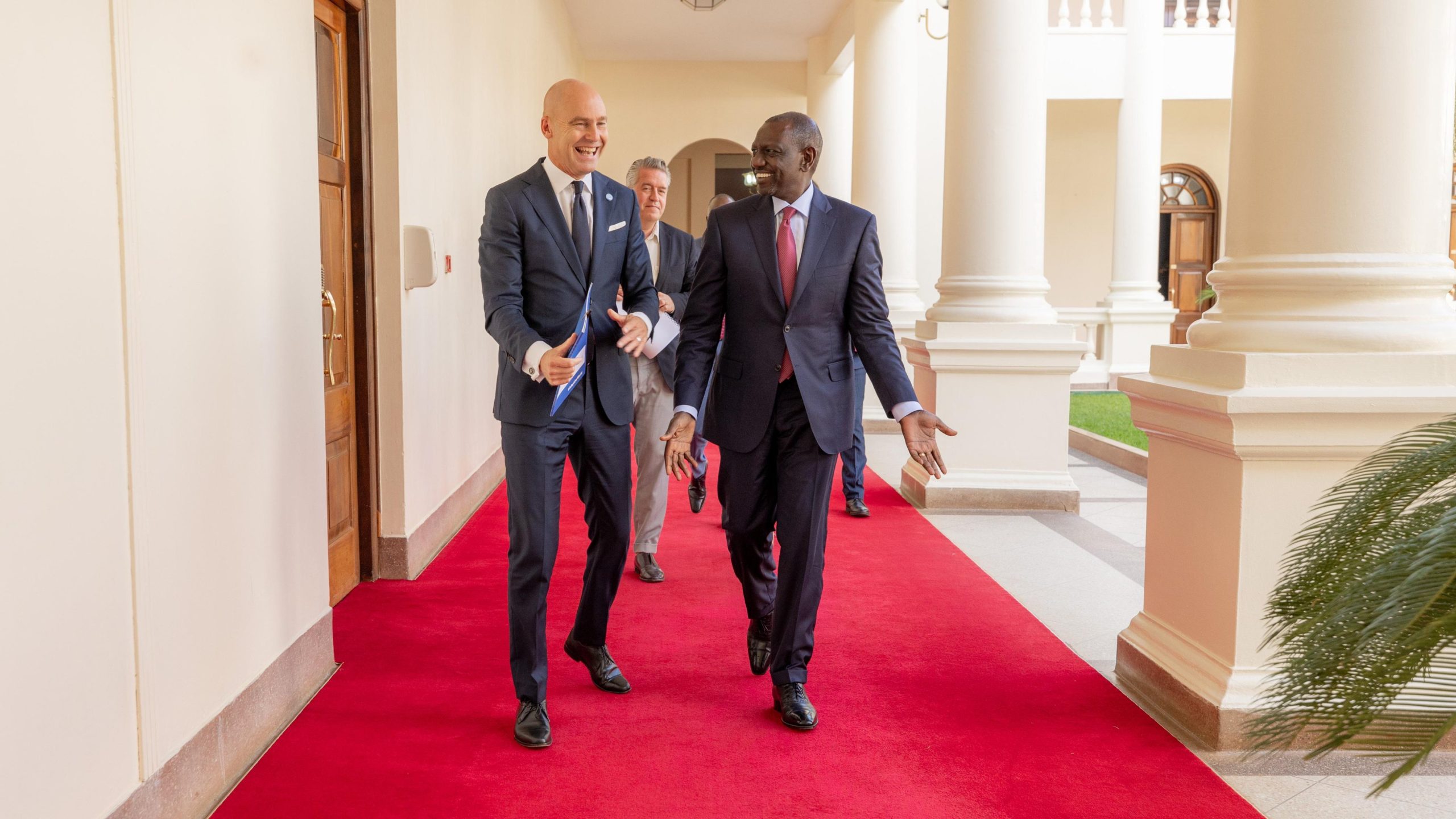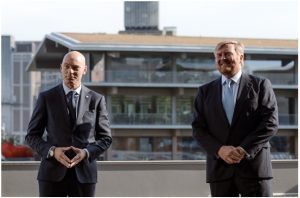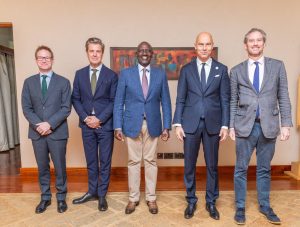Business
As Kenya Grants Sweeping Powers to Climate Group, Questions Mount Over Sovereignty and the New Global Order
The immunities granted to the GCA—including protection from lawsuits, tax exemptions, and inviolability of premises—mirror those typically reserved for sovereign states or United Nations agencies, not for what is essentially a well-funded nonprofit with powerful backers.

NAIROBI, Kenya — The timeline is almost too neat to be coincidental. In December 2023, the Global Centre for Adaptation, led by Dutch professor Patrick Verkooijen, quietly transferred approximately €1.2 million to the University of Nairobi for a climate research partnership.
Weeks later, in January 2024, President William Ruto appointed that very same Verkooijen as Chancellor of the University of Nairobi, the same institution that had just received money from his organization.
Then, as if choreographed, the dominoes began to fall. By 2025, the Dutch government, the GCA’s original home, had lost faith entirely. Multiple ministries, including Infrastructure and Water Management and Foreign Affairs, announced they would withdraw funding, citing budget constraints, governance concerns, and questions about political entanglement.
In diplomatic language, this translates to something simpler: they no longer trusted how the organization was being run.
Yet while the Netherlands was backing away, Kenya was racing forward. On a sweltering July morning, President Ruto laid the cornerstone for what would become the gleaming new headquarters of the Global Centre for Adaptation in Nairobi.
Standing beside Ban Ki-moon, the former United Nations secretary general who co-founded the organization, Ruto spoke of partnership and progress, of turning vulnerability into opportunity. They called it a “dual headquarters” arrangement, suggesting the GCA would maintain operations in both Rotterdam and Nairobi.
But the truth was simpler and starker: The Dutch government wanted nothing more to do with the organization, and the GCA was already orchestrating its complete relocation to Kenya.
What Ruto did not mention that July day were the extraordinary privileges his government had quietly granted the organization four months earlier.
The decision, formalized through Legal Notice No. 82 on May 2, 2025, and approved by Parliament in late September without substantive public debate, grants the GCA immunities so sweeping they effectively place this private climate organization beyond the reach of Kenyan law.
Protection from lawsuits, tax exemptions, inviolability of premises and archives, freedom from administrative oversight: these are privileges typically reserved for sovereign states or United Nations agencies, not for what is essentially a well-funded nonprofit with powerful backers and an increasingly questionable track record.
But there’s another detail, almost brazen in its audacity.

The Centre for Global Adaptation CEO Patrick Verkoojien with the King of Netherlands Willem Alexander at the inauguration of Prof Dr Patrick Verkoojien’s Centre for Global Adaptation floating office at Rotterdam in 2021.
The new GCA headquarters will also house Mazingira House, the headquarters of Kenya’s Ministry of Environment , the very government agency meant to regulate environmental policy and partnerships like this one.
The regulatory body will now operate from within the premises of an organization it is supposed to oversee, an organization that cannot be investigated, audited, or sued under Kenyan law.
Consider the circular logic: A foreign organization gives money to a Kenyan university, then its CEO is appointed to lead that university, then that organization receives diplomatic immunity in Kenya, then the Kenyan government moves its environmental ministry into the organization’s headquarters.
Each step might appear defensible in isolation, but taken together they form a pattern that looks less like partnership and more like institutional capture.
The financial trail deserves scrutiny.
The University of Nairobi and the GCA signed an agreement to scale up climate adaptation initiatives by providing policy advice, undertaking research and knowledge exchange, and offering professional short courses.
But when money flows from an organization to a university, and the organization’s leader then becomes the university’s chancellor, the independence necessary for genuine policy advice evaporates. Who will the university’s researchers critique? Whose methodologies will they question?
The Netherlands connection tells a cautionary tale that Kenya appears determined to ignore.
The Netherlands will stop funding the Global Center on Adaptation in Rotterdam after next year, threatening the future of the institute and raising the prospect of relocation to Kenya . This wasn’t a decision made lightly.
The Dutch government, which had championed the GCA since its founding, conducted extensive evaluations of its effectiveness, governance structures, and strategic direction.
What they found troubled them enough to walk away from an organization operating from their own floating office on Rotterdam’s waterfront.
The specific concerns raised by Dutch ministries remain largely opaque, shrouded in the carefully calibrated language of diplomatic disengagement.
But the decision to defund speaks volumes.
In wealthy European nations with robust civil society, independent media, and strong parliamentary oversight, questions about organizational effectiveness and governance can become impossible to ignore. The GCA faced those questions in the Netherlands and evidently could not provide satisfactory answers.
Kenya, with far less institutional capacity to monitor and hold accountable powerful international actors, has instead opened the door wider, offering not just a new home but a legal fortress from which to operate.
The parallels to another powerful foundation are impossible to ignore.
In 2024, Kenya granted similar sweeping immunities to the Bill & Melinda Gates Foundation, only to suspend them after a public outcry and legal challenge.
The Gates Foundation found itself accused of operating beyond democratic accountability, pursuing agendas that prioritized technological fixes over community-led solutions.
The foundation quietly withdrew from pursuing a full host country agreement in April 2025, a tacit acknowledgment that the controversy had become untenable.
Now, the same script is playing out with the GCA, and the Gates connection is more than coincidental.
Bill Gates himself co-chaired the Global Commission on Adaptation alongside Ban Ki-moon and Kristalina Georgieva, the managing director of the International Monetary Fund.
The Gates Foundation remains a key funder of GCA operations, creating a web of interconnected interests that extends from Seattle boardrooms to Kenyan soil.
The immunities themselves are breathtaking in scope. The GCA’s premises cannot be entered by Kenyan authorities without consent.
Its archives and documents are inviolable.
It can import and export goods for official use without paying customs duties. Its assets cannot be seized or subjected to any form of administrative or legal process without explicit waiver.
Officials and staff enjoy protection from legal proceedings related to their official duties, exemptions from income tax, and diplomatic-style privileges.
For an organization working on climate adaptation, which inevitably involves land use, agricultural practices, and infrastructure projects that can displace communities or alter livelihoods, such blanket immunity raises profound questions.
Consider a hypothetical scenario: The GCA partners with a Kenyan county government on a climate-resilient infrastructure project, perhaps a dam or irrigation system.
The project displaces a farming community or disrupts water access downstream.
Under normal circumstances, affected citizens could sue for compensation or seek injunctions. But if the GCA’s immunity shield holds, those legal avenues might be foreclosed.
Or consider financial arrangements.
The GCA works extensively on climate finance mechanisms, including carbon markets and adaptation funds.
If disputes arise over the terms of these arrangements, if smallholder farmers claim they were misled about carbon credit agreements or that promised payments never materialized, would the GCA’s immunity prevent them from seeking legal remedy? The Order is silent on these questions.
The carbon market dimension is particularly troubling given Verkooijen’s fingerprints on Kenya’s climate policy architecture.

President William Ruto hosted The Centre for Global Adaptation officials where the deal was sealed to setup its headquarters in Nairobi.
He is credited with shaping the contentious 2023 amendments to the Climate Change Act that opened the door to carbon trading, a mechanism that has sparked fierce debate globally about whether it represents genuine climate action or a new form of resource extraction wrapped in green rhetoric.
In much of Africa, carbon offset schemes have been criticized for dispossessing communities of land rights, introducing opaque contractual arrangements, and prioritizing the climate accounting needs of distant corporations over local livelihoods.
Now, the architect of these policies leads both the GCA and the University of Nairobi, positions that compound rather than check each other’s power.
As chancellor, Verkooijen wields considerable influence over one of Africa’s premier research institutions.
As GCA CEO, he leads an organization that benefits from Kenya’s climate policies and now enjoys extraordinary legal protections. The potential for these roles to reinforce each other in ways that serve institutional rather than public interests is obvious, yet no mechanism for managing this tension appears to exist.
The parliamentary process that approved these privileges was cursory at best. The Departmental Committee on Environment, Forestry, and Mining issued a public call for views in July, giving interested parties just over two weeks to respond. The committee’s report, tabled and approved on September 30, offered little substantive analysis of potential downsides or alternative approaches. The debate lasted mere hours. Critical questions went unasked: Why does this organization require diplomatic immunity? What recourse will Kenyans have if harmed by GCA activities?
On Kenyan social media, the response has been pointed. One widely shared post captured the prevailing mood: “Why should Kenya give an NGO immunity? Our leaders act like puppets for whose benefit? Not ours.”
Another asked the most fundamental question: “If you’re here to help us adapt to climate change, why do you need immunity from our courts?”
The physical co-location of the Environment Ministry within the GCA headquarters is perhaps the most brazen element of this arrangement.
How can officials meaningfully oversee an organization that literally provides their office space, that cannot be investigated or audited, and whose CEO holds a position of power within Kenya’s premier university?
The arrangement recalls situations in other sectors where regulatory capture has hollowed out government oversight. When regulators become physically and financially dependent on those they regulate, independence becomes theoretical rather than real.
The Dutch withdrawal from funding the GCA should have prompted deep reflection in Nairobi about what the Netherlands had learned.
Instead, it seems to have been interpreted as an opportunity, a chance to position Kenya as the GCA’s savior and primary host. But the Netherlands didn’t walk away because they misunderstood climate adaptation.
They walked away because close examination revealed problems serious enough to justify cutting ties with an organization they had helped create and championed for years.
For ordinary Kenyans, the abstraction of diplomatic immunity may feel remote from daily concerns about drought, flooding, and food security.
But these legal frameworks shape who gets to make decisions about climate adaptation strategies and who benefits when adaptation projects unfold.
They determine whether a farmer in Turkana or a fisher on Lake Victoria has any recourse if a climate project harms their livelihood.
The sequence of events tells a story of calculated maneuvering.
The December 2023 funding to the University of Nairobi, the January 2024 appointment of Verkooijen as chancellor, the May 2025 granting of immunities, the July 2025 groundbreaking ceremony, the September 2025 parliamentary approval, all while the Netherlands was backing away.
Each step might have its own justification, but collectively they reveal an organization securing institutional footholds, building dependencies, and establishing legal protections that will make it nearly impossible to dislodge or hold accountable.
As the GCA prepares to establish its full operations in Nairobi, with Kenya’s Environment Ministry operating from within its headquarters and diplomatic immunity shielding it from oversight, fundamental questions remain unanswered: In whose interests does this organization truly operate? Who will have the power to ask that question when things go wrong?
And if the Netherlands, with all its resources and oversight capacity, decided this organization was not worth continued support, what does Kenya know that the Dutch do not?
The privileges granted ensure that, should conflicts arise, the answers will be found outside Kenyan courtrooms, beyond the reach of Kenyan law, and probably beyond the influence of Kenyan citizens.
That is not partnership. That is something else entirely, a form of climate colonialism where the language of cooperation masks relationships of subordination, where urgent global challenges justify arrangements that concentrate power and diffuse accountability.
If this is what “climate partnership” looks like, then perhaps it’s time Kenya started asking who’s really adapting to whom.
Kenya Insights allows guest blogging, if you want to be published on Kenya’s most authoritative and accurate blog, have an expose, news TIPS, story angles, human interest stories, drop us an email on [email protected] or via Telegram
-

 Grapevine2 weeks ago
Grapevine2 weeks agoAlleged Male Lover Claims His Life Is in Danger, Leaks Screenshots and Private Videos Linking SportPesa CEO Ronald Karauri
-

 Grapevine1 week ago
Grapevine1 week agoRussian Man’s Secret Sex Recordings Ignite Fury as Questions Mount Over Consent and Easy Pick-Ups in Nairobi
-

 Investigations5 days ago
Investigations5 days agoMulti-Million Dollar Fraud: Three Kenyans Face US Extradition in Massive Cybercrime Conspiracy
-

 Economy4 days ago
Economy4 days agoIran Demands Arrest, Prosecution Of Kenya’s Cup of Joe Director Director Over Sh2.6 Billion Tea Fraud
-

 News3 days ago
News3 days agoTHE FIRM IN THE DOCK: How Kaplan and Stratton Became the Most Scrutinised Law Firm in Kenya
-

 Business5 days ago
Business5 days agoA Farm in Kenya’s Rift Valley Ignites a National Reckoning With Israeli Investment
-

 Business2 weeks ago
Business2 weeks agoM-Gas Pursues Carbon Credit Billions as Koko Networks Wreckage Exposes Market’s Dark Underbelly
-

 Africa1 week ago
Africa1 week agoFBI Investigates Congresswoman Ilhan Omar’s Husband’s Sh3.8 Billion Businesses in Kenya, Somalia and Dubai

















